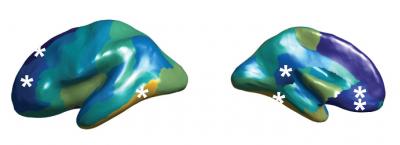
Credit: Clyde Francks, MPI Nijmegen
The left and right halves of our brains develop differently, as each hemisphere ‘specialises’ in certain functions. For example, for most people the left hemisphere–controlling the right hand–is dominant for language. But brain asymmetry is sometimes affected in people with developmental or psychiatric disorders like autism, which is characterised by impaired social cognition, repetitive behaviour and restricted interests. PhD student Merel Postema explains: “Previous studies have suggested that people with autism spectrum disorder are less likely to have the typical asymmetries for language dominance or hand preference. However, it has not been clear whether asymmetry of the brain’s anatomy is affected in autism, because different studies have reported different findings.”
Do people with autism have a more symmetrical brain? To settle this question, scientists from the international ENIGMA consortium of brain researchers decided to do a large-scale study, based on brain scans that were collected in different countries over more than 20 years. This is by far the largest ever study of this question, using brain scan data from 1,774 people with autism and 1,809 healthy controls.
The team found that the left and right cerebral hemispheres of the brain are indeed more similar in people with autism. In other words, people with ASD had less brain asymmetry. The reduced asymmetry was mostly found for cortical thickness, at various locations across the brain’s surface. In the healthy brain, the thickness of the cerebral cortex (the thin layer of gray matter that covers the brain) differs between the left and right hemispheres. Importantly, the anatomical differences did not depend on age, sex, IQ, the severity of symptoms, or medication use.
“The very small average differences in brain asymmetry between affected people and controls mean that changes of brain asymmetry will not be useful in terms of clinical prediction”, says study leader Clyde Francks. “But the findings might inform our understanding of the neurobiology of autism spectrum disorder”.
As the bulk of the data were from children, the findings suggest that altered development of the brain’s left-right axis is involved in autism, affecting widespread brain regions with diverse functions. For example, many of the affected brain regions overlap with the default mode network, which is a network of inter-connected brain regions that is particularly active during passive rest and mind-wandering, rather than when doing a specific task. Why this might relate to ASD may be a topic of future research.
###
Publication
Postema, M.C., Van Rooij, D., Anagnostou, E., Arango, C., Auzias, G., Behrmann, M., … Francks, C. (2019). Altered structural brain asymmetry in autism spectrum disorder in a study of 54 datasets. Nature Communications. DOI: 10.1038/s41467-019-13005-8
Questions? Contact:
Clyde Francks
Email: [email protected]
Marjolein Scherphuis (press officer)
Phone: +31 24 3521947
Email: [email protected]
Media Contact
Marjolein Scherphuis
[email protected]
31-243-521-947
Related Journal Article
http://dx.




